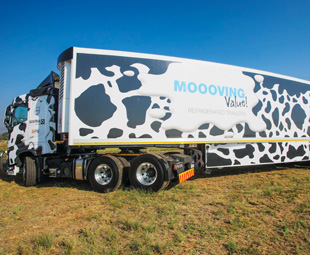Cool Technology for refrigerated trailers

Technology drives the refrigerated trailer sector by providing the latest cooling solutions to ensure the safety of goods and the sustainability of refrigeration fleet businesses. WILLIAM GEORGE finds out about some of the latest solutions
Erika Smets, marketing communications leader at transport temperature-control solutions manufacturer Thermo King, says: “The science of refrigerated transportation is advancing. Exploring and employing present and emerging technologies is key to navigating these times.”
Thermo King launched a series of educational videos for its customers to help them improve their business operations. The videos are aimed at keeping customers up to date with the fundamentals of refrigeration and the latest technological innovations, and to help optimise their business operations.
“Our goal at Thermo King is to have true partnerships with fleet operators and drivers by understanding their needs and offering them solutions to improve their business processes, increase efficiency and achieve operational savings,” says Smets.
Refrigerated trailers have to offer the best solutions to make distribution and operations simple, safe and efficient for those involved in the cold supply chain.
In terms of security, solar energy solutions provider, Trailer Sol, offers its clients the Ranger TX – a tracking unit for trailers to assist in pinpointing the exact location of a trailer at any given time.
Ranger TX provides daily health checks. A web view is offered to the client to monitor a vehicle’s status and location and an early warning trigger is activated in the event of towing being required. The device also monitors the temperature of the trailer in real time. Ranger TX offers a live and historical record of the door openings in spreadsheet format.
Trailer suppliers are advancing by using technology to provide support along with their products. “Customers demand good-quality trailers that offer the best performance and are up-to-spec,” says Llywellyn Madikizela, brand manager at Henred Fruehauf. “We aim to provide a one-stop shop, where our clients will have all that they need.”
Companies such as Henred Fruehauf and Trailer Sol also extend their support to clients on Sundays and public holidays to ensure less downtime and increased productivity.
When developing its cold trailer, Eqstra Flexi Fleet – a division of Eqstra Fleet Management and Logistics – considered the nature and demands of the environment in which businesses operate.
Partnering with New Way, Ice Cold Bodies and Javgro Transport Refrigeration Solutions, Eqstra Flexi Fleet designed a cold trailer that will withstand challenges of the rough terrain, long distances and high ambient temperatures encountered in the South African Development Community (SADC) region.
CEO of Eqstra Fleet Management and Logistics, Jacqui Carr, says it is the company’s strategy to keep ahead of current technology and to offer customers the latest sophisticated systems to ensure increased efficiency and subsequent cost savings in the daily operations of their fleet.
Eqstra Flexi Fleet’s new trailer design includes a fully curved roof (the first of its kind in South Africa), which increases the strength of the body. It also improves the aerodynamics of the trailer, fuel consumption and air circulation within the trailer. Side skirts help channel airflow away from the wheels to reduce turbulence.
“Another design first is that the aluminium extrusion floor is bonded to the floor structure during the vacuum process. This greatly enhances durability and strength, as do the three-millimetre stainless-steel kick plates,” says Burt Gildenhuys, MD at Ice Cold Bodies.
“In addition, a newly designed lightweight aluminium bulkhead has been fitted to prevent damage to the front wall, while a stainless-steel fridge protector has been installed on the outside to protect the cooling unit.”
GM at Eqstra Flexi Fleet, Johnnie Marais, says: “Truck engines now are designed to meet the strict emission laws and are significantly more efficient than the diesel engines within the cooling units.”
“It was mandatory for us to develop technology that draws on this sophisticated engineering to make our cooling units more efficient and more environmentally friendly,” says Marais.
A Hydro-Joule unit is mounted to the side of the truck and is powered via a hydraulic pump, driven by a clutch-independent engine power take-off (PTO). Once the system is active, the hydraulic pump delivers high-pressure hydraulic fluid to a hydraulic motor, which, in turn, powers an AC generator and produces the 400 VAC/50 Hz needed to power the cooling unit.
The driver is able to switch the system on and off from the cabin by means of an auxiliary PTO switch.
The cooling unit can now run off both its own diesel engine and its electric standby motor. However, by powering the unit from the more efficient, more environmentally friendly truck engine, it will reduce maintenance costs, reduce fuel consumption and will, ultimately, reduce harmful emissions.
Published by
Focus on Transport
focusmagsa



